app design software for windows
The best design apps for Windows
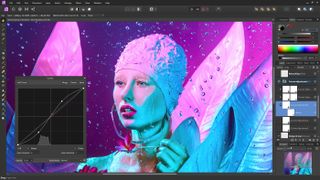
Design apps for Windows might seem like an oxymoron. Once, if you were a professional graphic designer, the Mac was the only game in town. Now, though, Windows machines are worthy options for design projects. And there's a huge array of design apps for Windows to use.
Yes, there are a few outliers, such as Sketch, that refuse to move away from Apple's platform. But in the main, everything you can do on a Mac, you can use on a Windows laptop or desktop computer. So what are the best apps for Windows for your money?
In this post, we select – in no particular order – the best design apps for Windows on the market today, and give you the information you need to choose between them.
Want more kit options? See our guide to the best laptops for graphic design. Alternatively, if you're more interested in drawing and painting digitally, check out our pick of the best digital art software.

01. Adobe Photoshop
Industry standard photo editing and raster design tool.
Specifications
Used for: Image editing and manipulation, photo retouching, graphic design, web and app prototyping, 3D modelling
Payment model: Subscription
Free trial: 30 days
Platforms: Mac, Windows, iPad
Reasons to buy
+Industry standard +Creative Cloud integration +3D capabilities
Reasons to avoid
-Expensive
Possibly the best known of all design apps for Windows, Photoshop has dominated the profession for the last three decades, and remains the go-to for studios everywhere. Indeed, you'll probably struggle get a job without knowing how to use it. If you're a freelancer, of course, you have more scope for using other software, but it will probably be difficult to avoid it altogether.
But is it a any good? Well, with so many design apps for Windows around, you don't stay on top in an ever-expanding industry for nothing, and Adobe has made strident efforts to update its tool to keep it relevant over the years, for example adding powerful 3D modelling and 3D printing features, and launching an iPad version. This app is getting more and more sophisticated by the day; in March, for example, Adobe added cloud documents version history, and support for cloud documents in offline mode.
The main reason to consider an alternative is price. Photoshop, like other Adobe tools, is now only available as part of a Creative Cloud subscription, and that doesn't come cheap.
Having said that, there are discounts to be had (check out the latest Creative Cloud discounts), and if you're using multiple CC tools, then the interoperability between them, and other services like Adobe Fonts and Adobe Stock, can often make the extra cost a good investment in your career.

02. Adobe Illustrator
Popular and established vector editing tool.
Specifications
Used for: Illustration, designing vector graphics
Payment model: Subscription
Free trial: 30 days
Platforms: Mac, Windows, iPad
Reasons to buy
+Industry standard +Creative Cloud integration +Smart AI cropping
Reasons to avoid
-Expensive
First launched in 1987, Illustrator has been the natural companion to Photoshop for generations of illustrators and designers, and it's long been considered the standard vector drawing tool for the industry. That dominance is starting to ebb a little, with a rush of new rivals into the space. But it remains one of the most sought-after design apps for Windows.
As with Photoshop, its rivals are largely competing on price, and for those whom money is less important than efficiency, Illustrator remains a hugely powerful and versatile tool, that Adobe is constantly making efforts to improve further.
The biggest addition of recent years have been a Freeform Gradients tool that makes it super-easy to create rich gradients, a Global Editing feature that lets you simultaneously make changes across all instances of a similar object, and a smart cropping tool that automatically suggests crops based on AI. Illustrator has also now launched on the iPad, and the latest updates to this app in March and April make it much easier for you to share your work with colleagues and collaborators.
More broadly, the issues that apply to Photoshop apply to Illustrator too. On the plus side, its ubiquity makes it a good tool to learn for your career, and the integration with the Creative Cloud can help make your workflow smooth and speedy. On the downside, its decades-old codebase and interface are becoming a little bloated and well, there's that monthly subscription.
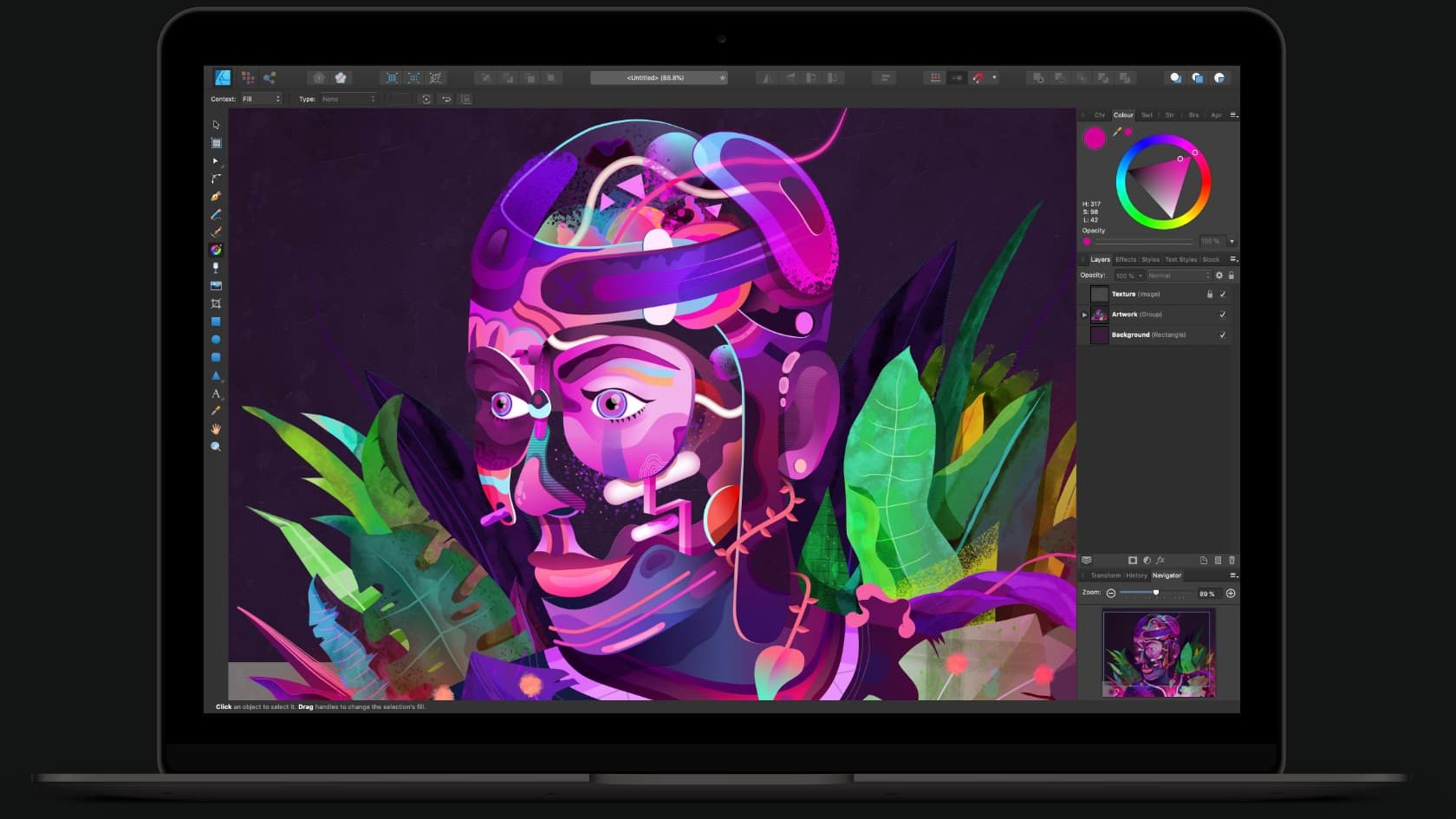
03. Affinity Designer
Professional-grade rival to Illustrator, at an affordable price.
Specifications
Used for: Illustration, designing vector graphics
Payment model: One-off purchase
Free trial: 90 days
Platforms: Mac, Windows, iPad
Reasons to buy
+Powerful features +Affordable price +Integrates with other Affinity apps
Reasons to avoid
-Lacks some advanced tools
Since its release for Windows in 2016, Affinity Designer has offered PC-using professionals a grown-up alternative to Illustrator, including a complete vector and pixel editing toolset, 10 million per cent zoom, non-destructive effects and adjustment layers, and more.
While some capabilities in Illustrator are absent, such as distortion or warp effects, most of what you can do in Adobe's tool, you can do in Affinity Designer. And the interface is similar enough that it's easy to pick up and use intuitively.
Coded for the latest computers and tablets, makers Serif claim that Affinity Designer runs faster than Adobe's products, and anecdotal evidence suggests that's very much the case, as long as you're using relatively modern equipment. Affinity Designer is also staggeringly cheap, and you only pay once: there's no subscription.
That said, Illustrator remains the industry standard of all the design apps for Windows, and so there's somewhat of a chicken-and-egg problem; many studios don't want to use it until all studios are using it. Also, while Affinity Designer is interoperable with sister tools Affinity Photo and Affinity Publisher (see below), there's not yet anything approaching the complexity of the Creative Cloud ecosystem, with its endless number of tools, and integrated Adobe Fonts and Adobe Stock options.
For freelancers who have more freedom to organise how they work, though, this most affordable of design apps for Windows is certainly worth considering. The app is constantly being improved, and an update this February introduced a new tool to add contours and line offsets to any shape or path, plus the ability to place linked images and resources.

04. Affinity Photo
Low-cost rival to Photoshop that's surprisingly capable.
Specifications
Used for: Image editing and manipulation, photo retouching, graphic design, web and app prototyping
Payment model: One-off purchase
Free trial: 90 days
Platforms: Mac, Windows, iPad
Reasons to buy
+Streamlined interface +Fast working +Affordable price
Reasons to avoid
-Lacks some advanced features
Just as Affinity Designer rivals Illustrator, Affinity Photo is one of the design apps for Windows that offers an alternative to Photoshop. And it's a pretty familiar experience. Brushes, layers, masks, for example, are all treated in the same way as in Adobe's tool.
Affinity Photo is not, however, a carbon copy of Photoshop. Indeed, while some designers will complain that Affinity Photo doesn't do everything that Photoshop does, that's kind of missing the point. Essentially, this most budget-conscious of design apps for Windows is not weighed down with hundreds of features that try to please everyone, but is more streamlined for specific tasks.
Rather than a fully fledged graphics suite, Affinity Photo is better described as photo editing software with some good art and design tools, including some distinctive features like a saveable undo history, PSD Import/Export options and a non-destructive workflow. More recent additions in February's update include the ability to add liquify adjustments as live, maskable layers.
If you're looking for a full graphic design tool, you're better off – as the name suggests – with Affinity Designer (above), which has pixel design capabilities alongside its range of vector tools. But if photo editing is your main concern, Affinity Photo offers some excellent tools and capabilities, at a low, one-off price.
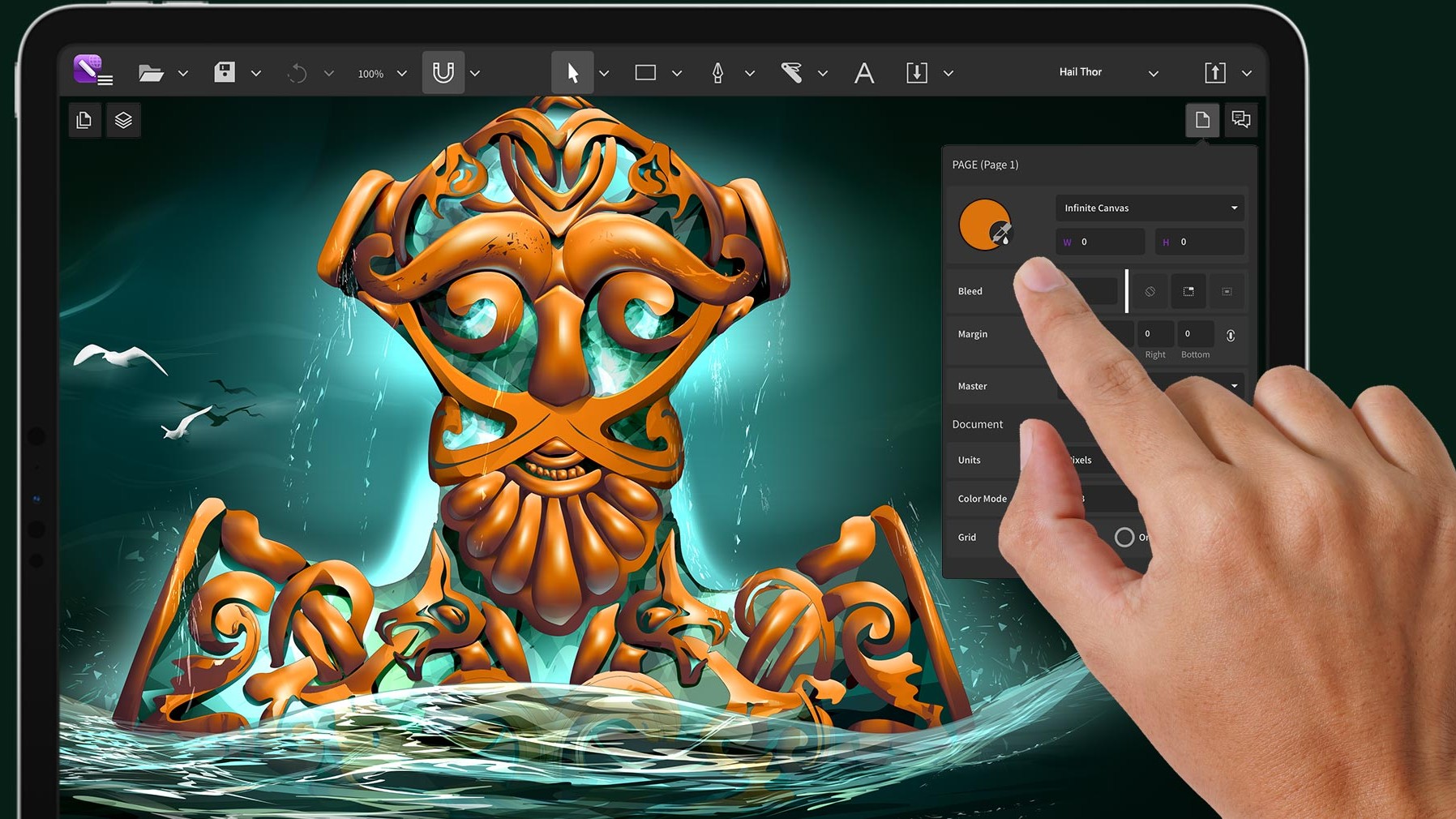
05. CorelDRAW Graphics Suite
Vector-based illustration tool with a broad fanbase.
Specifications
Used for: Vector illustration, page layout, image editing and manipulation
Payment model: One-off purchase or subscription
Free trial: 15 days
Platforms: Mac, Windows
Reasons to buy
+Powerful features +Intuitive interface +Choice of payment models
Reasons to avoid
-Not cheap
First launched in 1987, CorelDRAW is a vector-based illustration tool that's mainly focused on Windows (although in 2019 it did finally launch on MacOS).
So how does it compare with other design apps for Windows? Well, it's difficult to recommend it over Adobe Illustrator for features, while Affinity Designer easily beats it on value for money. But CorelDRAW continues to be popular amongst everyone from artists to graphic designers, so its makers are clearly doing something right.
In recent years, its standout improvement has been the LiveSketch tool: an innovative line drawing solution for designers and illustrators who want to bypass producing thumbnails on paper and freely sketch-out vector art at the source; this is particularly useful on a drawing tablet.
Other cool features in CorelDRAW include Colour Harmony, which lets you change the look of an object from one group of complementary colours to another; Pointiliser, which lets you create vector mosaics; and the way that every layer is represented with a thumbnail representation of the shape in question. More recently, the latest version (2020) brings new features powered by AI, cloud-based collaborative review options, and overall improved performance.
In short, CorelDRAW may not be the "best" at any one thing, but overall this is solid, well functioning and professional grade software for designers that's got a lot to recommend it.
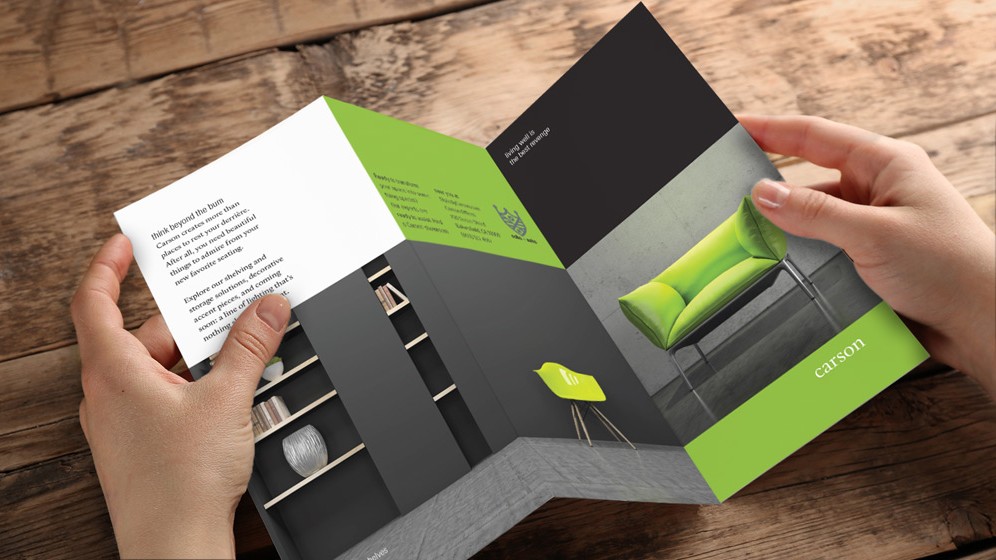
06. Adobe InDesign
The go-to desktop publishing suite for the print media.
Specifications
Used for: Desktop publishing
Payment model: Subscription
Free trial: Yes
Platforms: Mac, Windows
Reasons to buy
+Industry standard for print +Good e-publishing features +Continuing granular improvements
Reasons to avoid
-Requires subscription
Adobe Photoshop and Adobe Illustrator were pioneers in their respective fields of image editing and vector graphics. But when InDesign arrived on the scene in 1999, it was somewhat late to the party. The market for desktop publishing software at that time was dominated by QuarkXpress. But InDesign quickly took over, largely because of its lower price.
Nowadays, of all design apps for Windows, InDesign remains the industry standard for print publishing. And it's evolved over the years to include some pretty nifty digital publishing features too.
The main recent innovations have been small but important ones, such as support for endnotes and better font filtering, as well as better integration with the Creative Cloud. But on the whole, Adobe has avoided too much radical change. Updates continue are constantly being made, but they tend to be granular, rather than groundbreaking. An update this April, for example, introduced the ability to map the optical size of your text to automatically set the font size.
And that's actually quite smart, because one of the biggest appeals of InDesign is its familiarity to designers who've been using it for years, if not their entire careers. For those new to it, though, the interface is not that intuitive and so there is a bit of a learning curve.
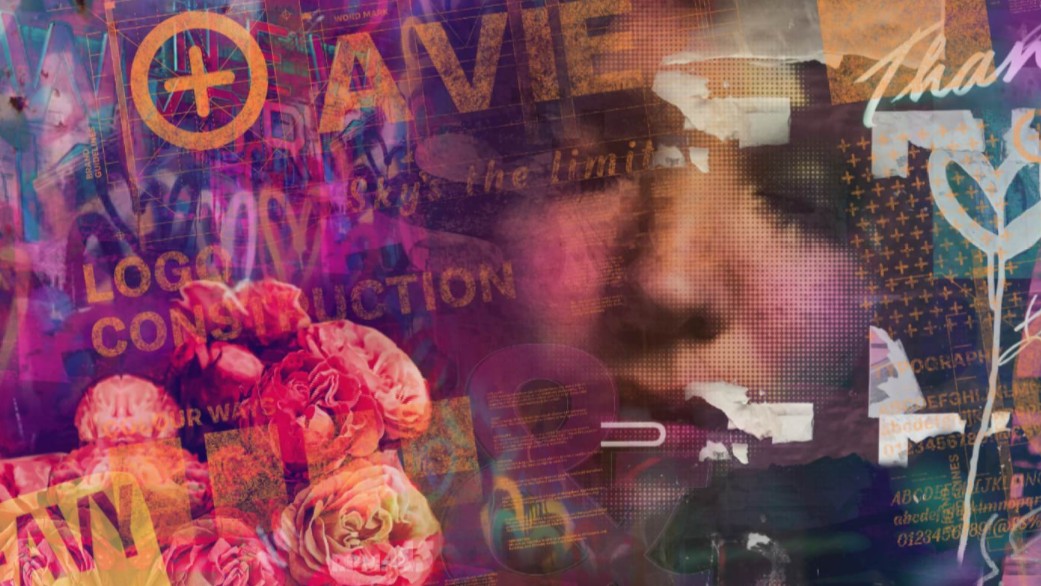
07. Affinity Publisher
Cheap and capable rival to Adobe InDesign.
Specifications
Used for: Desktop publishing
Payment model: One-off purchase
Free trial: 90 days
Platforms: Mac, Windows
Reasons to buy
+Easy to use +Affordable price +Interoperable with Affinity apps
Reasons to avoid
-Lacks some advanced features
Launched in 2019, Affinity Publisher is a low-priced alternative to InDesign, and the sister app to Affinity Designer and Affinity Photo (and a heads-up, there's a 50 per cent off sale at time of writing).
One of the cheapest design apps for Windows around, Publisher enables you to work with dynamic photo frames, tables, baseline grids and linked resources, all backed up with end-to-end CMYK, and headline features include advanced typography options, linked text frames, master pages, and facing page spreads.
The focus is very much on print publishing, and it isn't a particularly useful for digital design, not yet anyway. Nor is it as powerful or feature-rich as InDesign. But it's nicely integrated with the other two Affinity apps, it's cheap, and it's nicely intuitive and responsive in use.
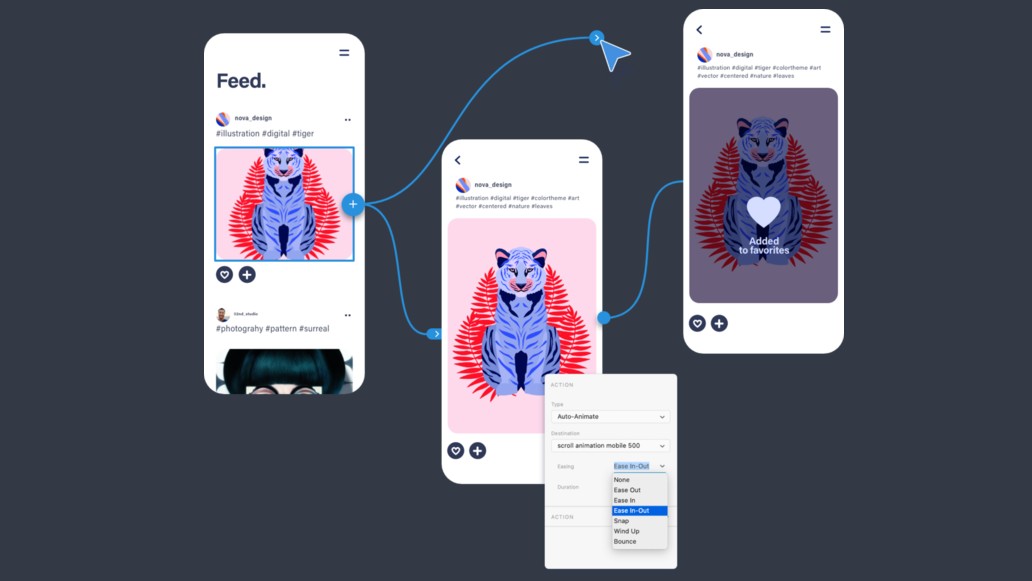
08. Adobe XD
Freemium tool for UI, web and app prototyping.
Specifications
Used for: Web and app prototyping
Payment model: Free or subscription
Free trial: No, but there is a free version
Platforms: Mac, Windows, with iOS and Android app for testing
Reasons to buy
+Powerful prototyping features +3D and VR tools +Free version
Reasons to avoid
-Premium tools require subscription
Launched in 2016, Adobe XD is a vector-based UX design tool that's popular for creating website wireframes and animated, click-through prototypes. Although you don't need a Creative Cloud subscription to use it, XD makes it easy to pull in existing design work from other Creative Cloud apps, such as Photoshop or Illustrator, plus there's a free companion app that lets you preview your work on iOS or Android devices.
There's a free version of Adobe XD, which give you access to a limited number of fonts and 2GB of cloud storage. With a subscription to the full version, meanwhile, you'll get access to the Adobe Fonts Portfolio, 100GB of cloud storage, plus unlimited editors, shared documents and shared links.
XD was a powerful tool on launch and Adobe has continued to add newer and better features on a regular basis. Since April, for example, you've been able to use voice commands, keyboard input, and gamepad input to trigger between states of components in your prototypes.
And that's good news for PC users looking for design apps for Windows, because not only has rival UI app Sketch not developed a Windows version, it's ruled out doing so.

09. Photoshop Elements
Simplified version of Photoshop that's cheap and easy to use.
Specifications
Used for: Image editing and manipulation, photo retouching
Payment model: One-off purchase
Free trial: Yes
Platforms: Mac, Windows
Reasons to buy
+Easy to use +One-off purchase +Free trial available
Reasons to avoid
-Not suitable for pros
Like Photoshop, but don't need all the features and want to save some money? Photoshop Elements is a raster graphics editor for entry-level photographers, image editors and hobbyists that contains most of the features of the professional version, but with fewer and simpler options.
Photoshop Elements is still about twice as expensive as Affinity Photo, so we'd suggest you take out a free 10-day trial of the latter first before committing. But if you're already familiar with Photoshop's interface and don't want to learn something new, it may well be worth the money.
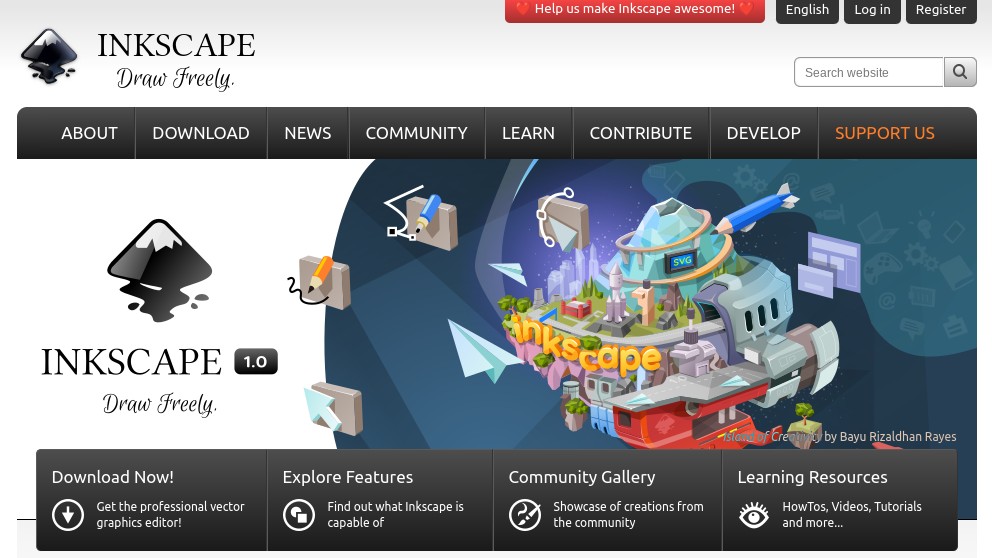
10. Inkscape
Free and open source vector editor with advanced features.
Specifications
Used for: Illustration, designing vector graphics
Payment model: Free
Free trial: N/A
Platforms: Mac, Windows, Linux
Reasons to buy
+Advanced feature set +Costs nothing +Worldwide community
Reasons to avoid
-Works slowly
If seeking a free graphic design tool for Windows, check out Inkscape. This open source vector editor comes with a surprisingly advanced feature set, including complex path operations, node editing, bitmap tracing and path-based text. Plus there's a broad and enthusiastic worldwide community behind it, so if you run into trouble, it's easy to get help and support.
The main downside of Inkscape, and the reason you might prefer to pay for a more sophisticated tool instead, is the speed of its operation, which is relatively slow and clunky. As always, though, that depends on the equipment you have. If you're using a super-speedy machine, you might find it's not a problem, and the fact it's free means it's certainly worth giving it a go.
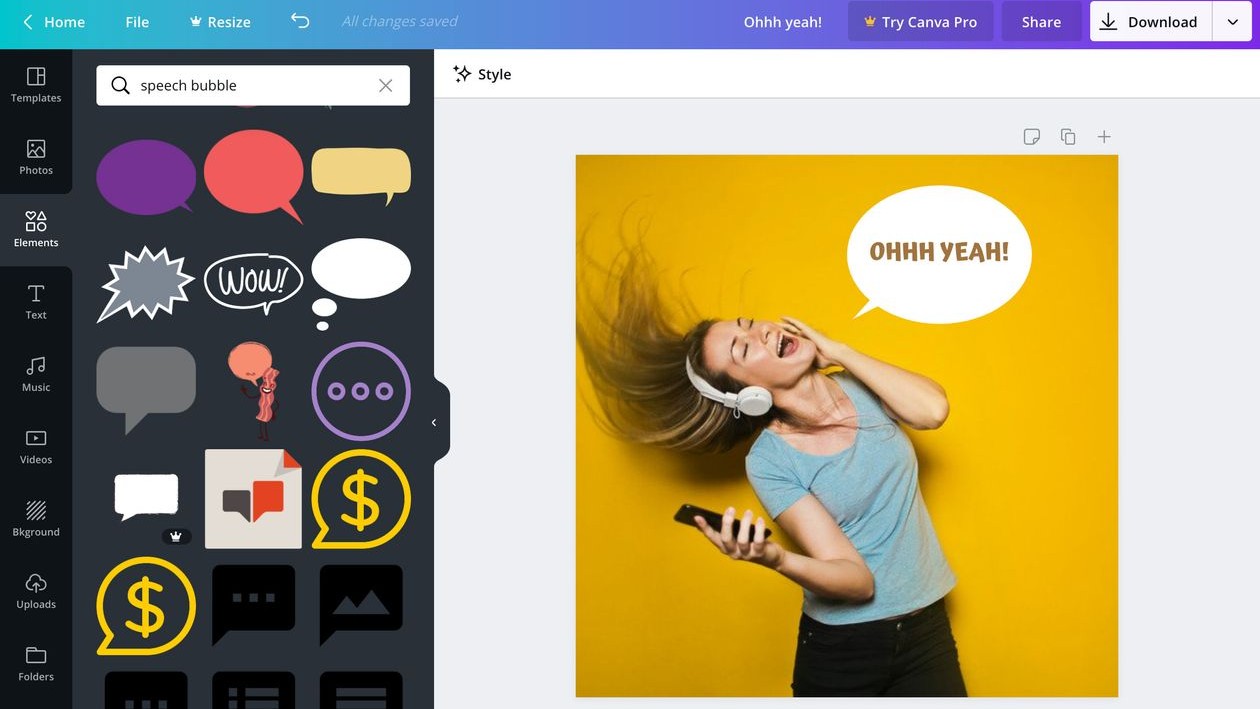
11. Canva
Browser-based graphics editor that's great for beginners.
Specifications
Used for: Designing social media graphics, presentations, posters, brochures
Payment model: Free
Free trial: 30 days
Platforms: Mac, Windows, Linux
Reasons to buy
+Easy to use +Free version +Pro version is cheap
Reasons to avoid
-Not as full-featured as others
Launched in 2012, Canva is a graphic design editor that works in the browser; so you can use it whether you're on a Windows, Mac or Linux computer or tablet. While it's more limited than full-blown design software like Photoshop, it is capable of creating a wide range of graphic assets, from social media graphics to brochure layouts, presentations to posters.
Based on drag-and-drop, and offering a range of templates, it's a great choice for beginners and amateurs wanting to get started with graphic design. Being housed in the browser, it's also great for sharing your work and collaborating with others.
The basic version of Canva is free, but you need to take out a subscription to unlock all the features, and access unlimited folders and thousands of templates. That subscription, though, is still pretty cheap compared to most of the tools on this list.
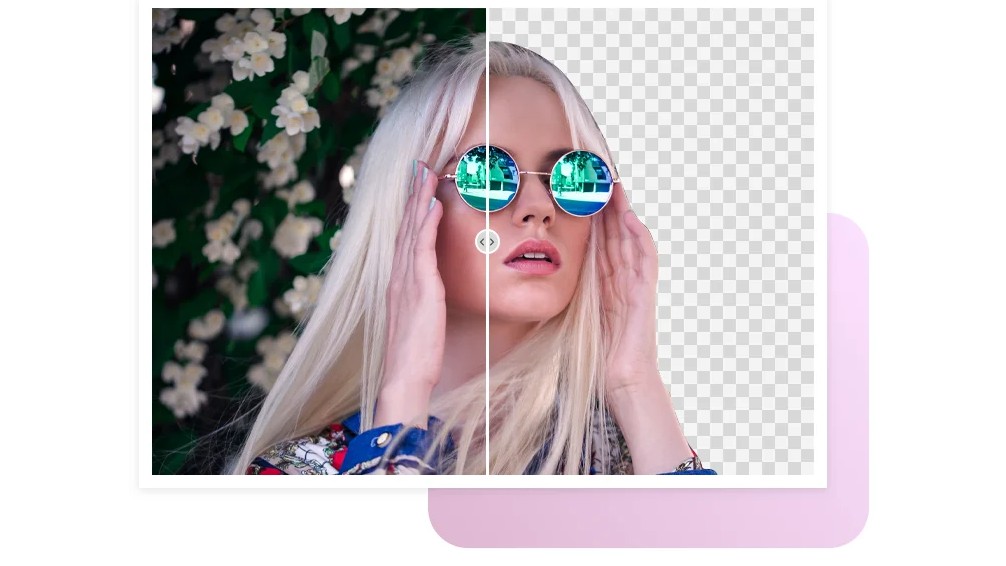
12. Pixlr
Freemium image editor that's ideal for quick edits.
Specifications
Used for: Photo editing and manipulation
Payment model: Free or subscription
Free trial: 30 days
Platforms: Browser
Reasons to buy
+Free version +Works fast +Easy interface
Reasons to avoid
-Artificial delays on free plan
Pixlr is a free photo editor that works in the browser, but is surprisingly packed with features. You can access the free version immediately, without even having to sign in. And it's all very intuitive to use, particularly if you've used any form of photo editing software before.
You don't just get tools for cropping and resizing, but also more sophisticated features such as shape, lasso, wand, liquify and clone tools. It's never going to replace Photoshop, as it's relatively limited: you can't work with RAW or TIFF files, for instance. But for a free app, it's incredibly capable.
In fact, it's so fast that even if you have Photoshop, you'll often find yourself using Pixlr instead when you just want to make a few quick tweaks to your images. Perhaps realising this, the makers have recently added in an artificial delay of a few seconds when you save images, which can be removed by taking out a subscription.
The paid plan also includes access to the more advanced Pixlr E – which boasts AI-powered features such as background removal – as well as added overlays, templates, and support for 8196 x 8196 image resolution.
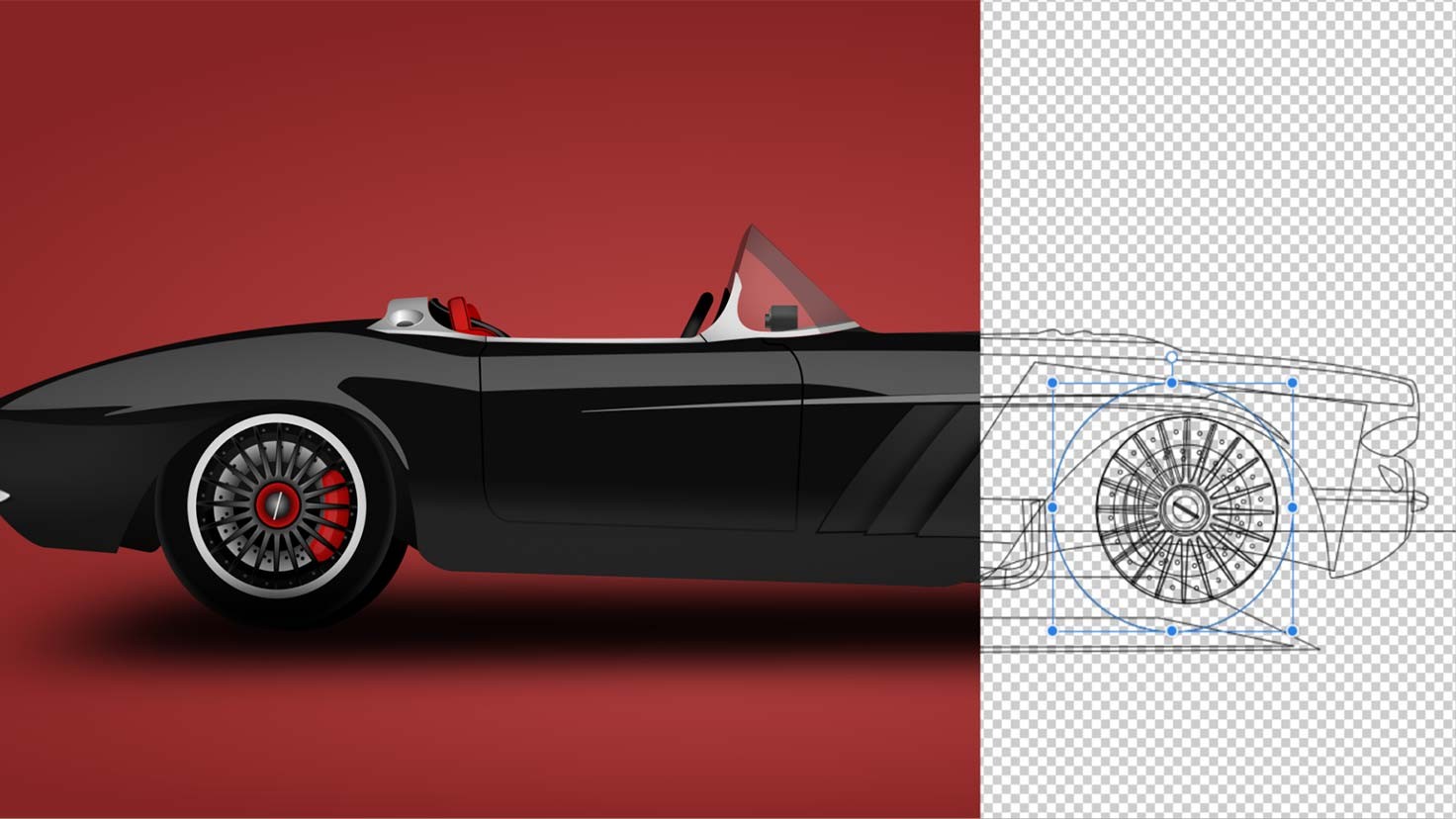
13. Gravit Designer
Free vector design app from the makers of CorelDRAW.
Specifications
Used for: Vector illustration, UI design, image editing
Payment model: Free or subscription
Free trial: 15 days
Platforms: Browser or desktop app for Mac OS, Windows, Linux, Chrome OS
Reasons to buy
+Wide range of features +Free version +Browser or desktop app
Reasons to avoid
-Subscribe for full features
Gravit Designer is a full-featured vector design app that you can use either in your browser or on your desktop as a downloadable app. Popular with graphic designers, product designers and web designers, it has a huge range of features allowing you to work on a diverse range of design tasks, from illustration and printed artwork to UI and logo design.
Brought to you by the makers of CorelDRAW, you automatically start with a 15-day free trial that includes all the features, then you have to take out a subscription, or will be scaled back to the more basic version. This is still pretty impressive: for example, you get 500MB cloud storage and can export PDFs at 72 and 150dpi. But upgrading will allow you to work in CMYK as well as RGB, work offline, export PDFs at 300dpi, get touchscreen support, and access version history.
Read more:
- Best computer for graphic design: Get the power you need
- Video editing for Windows: Top tools for creating quality video
- Best graphic design software: Free and paid-for options

Tom May is a freelance writer and editor specialising in design, photography and tech. He is author of Great TED Talks: Creativity, published by Pavilion Books. He has previously been editor of Professional Photography magazine, associate editor at Creative Bloq, and deputy editor at net magazine.
Related articles
app design software for windows
Source: https://www.creativebloq.com/features/10-best-design-apps-for-windows
Posted by: castillofille1973.blogspot.com

0 Response to "app design software for windows"
Post a Comment